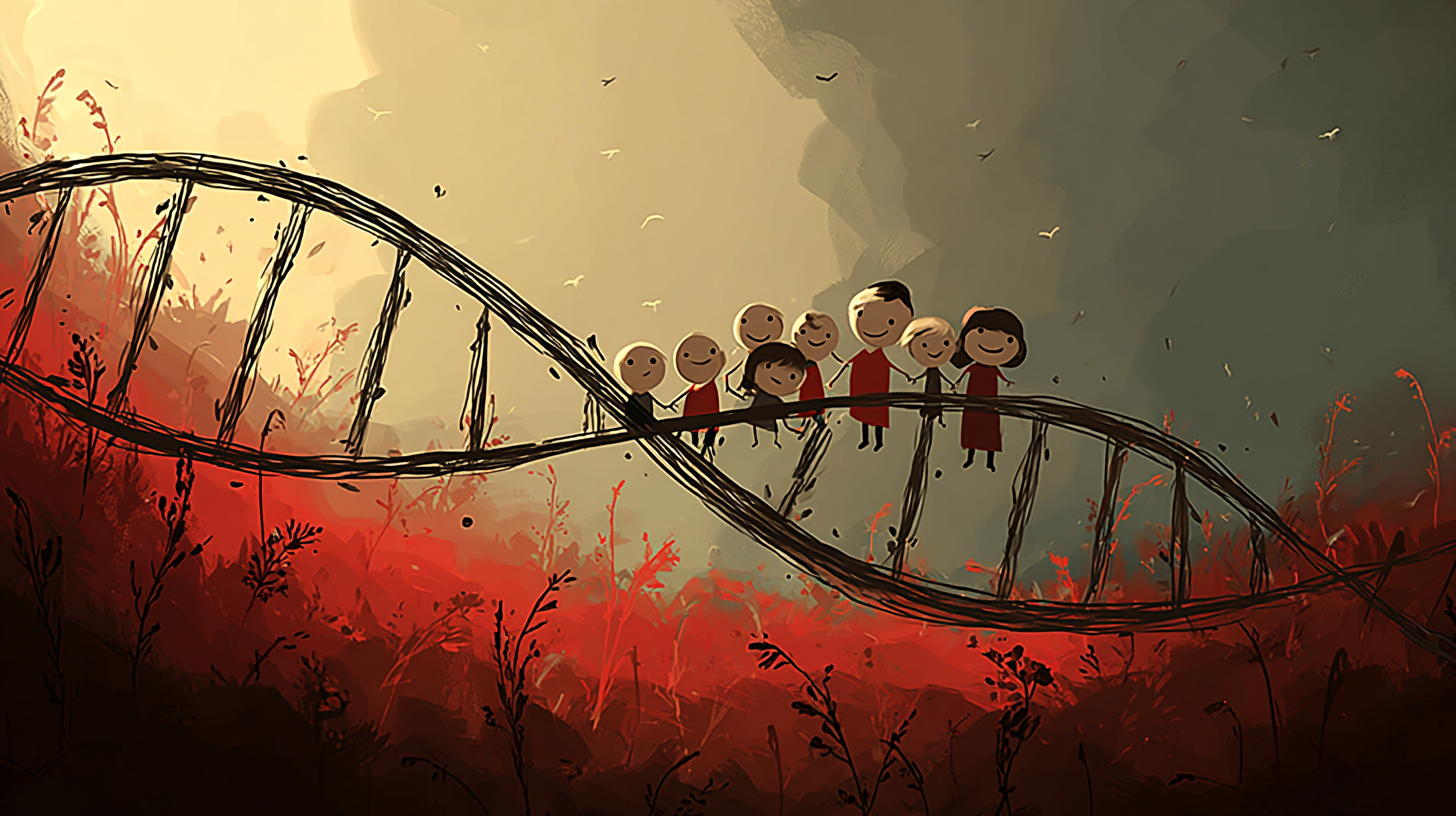A gene is a part of the body that carries information passed from parents to children.
「gene(ジーン)」は、髪の色や背の高さなどを親から子へ伝える体の情報のこと。
以下は英単語 “gene” に関するストーリー型学習コンテンツです。まずは大枠の意味を理解して最後の文章で確認しましょう。
主な意味(main meaning)
| 品詞 | 意味 | 発音記号 | 例文 |
|---|---|---|---|
| 名詞 | 遺伝子:生物の特徴を決める情報の単位 | /dʒiːn/ | Scientists discovered a new gene that affects eye color. |
語源(etymology)
「gene」はギリシャ語「genos(種族、生まれ)」に由来し、「生まれつきの特徴」や「起源」を表すイメージがあります。
類義語(synonyms)
| 類義語 | 例文 |
|---|---|
| DNA | DNA contains all the information needed to build and maintain an organism. |
| chromosome | Each human cell has 23 pairs of chromosomes. |
| genetic material | The virus inserts its genetic material into the host cell. |
| trait | Eye color is a trait passed down through genes. |
反義語(antonyms)
| 反義語 | 例文 |
|---|---|
| environment | Your health is influenced by both your genes and your environment. |
| behavior | Not all behaviors are determined by genes; many are learned. |
コロケーション(collocations)
| コロケーション | 例文 |
|---|---|
| genetic gene | A genetic gene can carry inherited diseases. |
| carry a gene | She carries a gene for a rare disorder. |
| gene mutation | A gene mutation may lead to cancer. |
| gene therapy | Gene therapy offers hope for curing inherited diseases. |
| dominant gene | Brown eyes are usually caused by a dominant gene. |
2項表現(binomials)
| 表現 | 例文 |
|---|---|
| genes and traits | Genes and traits work together to form who we are. |
| nature and nurture | The debate between nature and nurture is still ongoing. |
英語ストーリー(english story)
Title: “The Gene Test at Work”
Lisa worked at a health company that offered gene testing. One day, her boss asked her to handle a new client, Mr. Brown, who wanted to understand his family’s health risks. Lisa explained, “A gene is a unit of information passed from parents to children. It can tell us a lot about health.”
She used simple terms, saying, “Think of your genes like a recipe. They tell your body what to do.”
Mr. Brown nodded. “So, if there is a problem in the gene, it can lead to disease?”
“Exactly,” Lisa said. “Sometimes, a gene mutation causes illness. But we can check for such genes using tests.”
Mr. Brown was surprised. “I thought only my lifestyle mattered.”
Lisa smiled. “Your health depends on both your genes and traits and your environment. That’s why we consider both.”
Later, they looked at his test results. “You carry a gene for a heart condition,” Lisa said gently, “but don’t worry. A dominant gene means you might be at risk, but lifestyle also matters.”
Mr. Brown asked, “Can we fix this?”
“There’s a new treatment called gene therapy,” she replied. “It’s still developing, but it’s full of hope.”
After the session, Lisa reflected on how amazing the field was. She believed understanding nature and nurture could change lives.
和訳
タイトル:「職場での遺伝子検査」
リサは遺伝子検査を提供する健康関連会社で働いていました。ある日、上司から新しい顧客の対応を任されました。ブラウンさんというその男性は、家族の健康リスクを知りたがっていました。
リサは説明しました。「**gene(遺伝子)**は、親から子に受け継がれる情報の単位で、健康について多くのことがわかります。」
彼女は簡単に説明しました。「**gene(遺伝子)**はレシピのようなもので、体がどう働くかを教えてくれるんです。」
ブラウンさんはうなずきました。「つまり、遺伝子に問題があると病気になる可能性があるのですか?」
「その通りです」とリサ。「時には、**gene mutation(遺伝子の変異)**が病気を引き起こします。でも、検査でその遺伝子を調べられますよ。」
「生活習慣だけが健康に影響すると思っていました。」
リサは微笑みました。「健康は、**genes and traits(遺伝子と特性)**だけでなく、**environment(環境)**も関係しています。両方を考慮するのが大事なんです。」
その後、検査結果を見ました。「心臓の病気に関連する**gene(遺伝子)**を持っています」とリサはやさしく言いました。「でも心配しないで。**dominant gene(優性遺伝子)**があるとリスクはありますが、生活習慣も影響します。」
「直すことはできますか?」とブラウンさん。
「**gene therapy(遺伝子治療)**という新しい治療法があります」とリサ。「まだ発展中ですが、希望に満ちていますよ。」
その面談の後、リサはこの分野のすばらしさを改めて感じました。彼女は「nature and nurture(遺伝と環境)」を理解することが人生を変えると信じていました。
Q&A
- Q「gene」と「DNA」の違いは?
- A
「gene(遺伝子)」は、DNAの中の一部分で、体の特定の特徴(例:目の色や血液型)を決める情報単位です。
「DNA(デオキシリボ核酸)」は、体全体の遺伝情報を持っている物質で、その中に多くの遺伝子が含まれています。
- Q「gene」と「chromosome(染色体)」の違いは?
- A
「gene」は、DNAの中の小さな単位で、ある特定の情報を持っています。
「chromosome」は、DNAがぎゅっとまとまった形で、1本の染色体の中に何千もの「gene」が含まれています。
- Q「gene」と「genetic material(遺伝物質)」の違いは?
- A
「genetic material」はもっと広い意味で、遺伝子やDNAなど、遺伝情報を持つすべての物質を指します。
その中の一部として「gene」が含まれます。
- Q「gene」と「trait(特性)」の違いは?
- A
「gene」は特性を決める情報そのものです。
「trait」は、実際に現れる体の特徴(例:髪の色、身長など)を指します。「gene」が「trait」を決めるのです。
- Q「gene」と「environment(環境)」の違いは?
- A
「gene」は生まれつき持っている体の設計図です。
「environment」は育つ環境(食べ物、気温、人間関係など)で、後から影響を与える要素です。多くの体の特徴や病気のリスクは、両方の影響を受けます。
- Q「gene」と「behavior(行動)」の違いは?
- A
「gene」は体の基本的な構造や働きを決める情報です。
「behavior」は人の行動やふるまいを指し、遺伝だけでなく教育や経験にも大きく左右されます。
- Q「gene」と「gene mutation(遺伝子の変異)」の違いは?
- A
「gene」は正常な遺伝情報です。
「gene mutation」はその遺伝情報に変化が起きた状態で、病気や障害の原因になることがあります。
- Q「gene」と「gene therapy(遺伝子治療)」の違いは?
- A
「gene」は体に元からある情報です。
「gene therapy」はその遺伝子に問題があったとき、それを治すために新しい遺伝子を使う治療法です。
- Q「dominant gene(優性遺伝子)」とは?
- A
「dominant gene」は、1つでも持っていればその特徴が現れる強い遺伝子です。
例えば、茶色い目をつくる「dominant gene」が1つあるだけで、目は茶色になります。
- Q「genes and traits」の関係は?
- A
「genes」が情報、「traits」はその結果です。つまり、「genes」が「traits(体の特徴)」を作ります。
- Q「nature and nurture(遺伝と環境)」の違いは?
- A
「nature」は「gene」など、生まれつきのもの。
「nurture」は育った環境(教育、生活習慣)です。人の性格や能力は、この両方の影響を受けます。



コメント